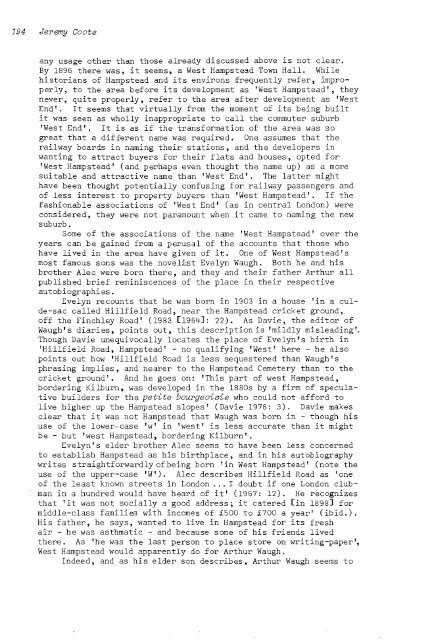CONTENTS NO.I - Institute of Social and Cultural Anthropology ...
CONTENTS NO.I - Institute of Social and Cultural Anthropology ...
CONTENTS NO.I - Institute of Social and Cultural Anthropology ...
Create successful ePaper yourself
Turn your PDF publications into a flip-book with our unique Google optimized e-Paper software.
194 Jeremy Coote<br />
any usage other than those discussed above is not clear.<br />
By 1896 there was, it seems, a West Hampstead Town Hall. While<br />
historians <strong>of</strong> Hampstead <strong>and</strong> its environs frequently refer, improperly,<br />
to the area before its development as 'West<br />
" they<br />
never, quite properly, refer to the area after development as 'West<br />
End'. It seems that virtually from the moment <strong>of</strong> its built<br />
it was seen as wholly inappropriate to call the commuter suburb<br />
'West End'. It is as if the transformation <strong>of</strong> the area was so<br />
great that a different name was<br />
One assumes that the<br />
railway boards in naming their stations, <strong>and</strong> the<br />
in<br />
wanting to attract buyers for their flats <strong>and</strong> houses, opted for<br />
'West Hampstead' (<strong>and</strong> perhaps even thought the name up) as a more<br />
suitable <strong>and</strong> attractive name than 'West End'. The latter might<br />
.have been thought potentially<br />
for railway passengers <strong>and</strong><br />
<strong>of</strong> less interest to property than 'West Hampstead'. If the<br />
fashionable associations <strong>of</strong> 'West End' (as in central London) were<br />
considered, were not paramount when it came to the new<br />
suburb.<br />
Some <strong>of</strong> the associations <strong>of</strong> the name 'West Hampstead' over the<br />
years can be from a perusal <strong>of</strong> the accounts that those who<br />
have lived in the area have given <strong>of</strong> it. One <strong>of</strong> West 's<br />
most famous sons was the novelist Waugh. Both he <strong>and</strong> his<br />
brother Alec were born there, <strong>and</strong><br />
published brief reminiscences <strong>of</strong> the<br />
<strong>and</strong> their father Arthur all<br />
in their<br />
autobiographies.<br />
Evelyn recounts that he was born in 1903 in a house 'in a culde-sac<br />
called Hillfield Road, near the Hampstead cricket<br />
<strong>of</strong>f the Finchley Road' (1983 [1964]: 22). As Davie, the editor <strong>of</strong><br />
Waugh's diaries, out, this is 'mildly misleading'.<br />
Though Davie unequivocally locates the place <strong>of</strong> Evelyn's birth in<br />
'Hillfield Road, Hampstead' - no<br />
'West' here - he also<br />
points out how 'Hillfield Road is less sequestered than Waugh's<br />
phrasing implies, <strong>and</strong> nearer to the<br />
Cemetery than to the<br />
cricket ground'. And he goes on: 'This part <strong>of</strong> west ,<br />
bordering Kilburn, was developed in the 1880s by a firm <strong>of</strong> speculative<br />
builders for the petite bourgeoisie who could not afford to<br />
live higher up the Hampstead slopes' (Davie 1976: 3). Davie makes<br />
clear that it was not Hampstead that was born in - though his<br />
use <strong>of</strong> the lower-case 'w' in 'west' is less accurate than it might<br />
be - but 'west<br />
, bordering Kilburn'.<br />
Evelyn's elder brother Alec seems to have been less concerned<br />
to establish<br />
as his birthplace, <strong>and</strong> in his<br />
writes straightforwardly <strong>of</strong> being born 'in West Hampstead'<br />
use <strong>of</strong> the upper-case 'W'). Alec describes Hillfield Road as 'one<br />
<strong>of</strong> the least known streets in London ... I doubt if one London clubman<br />
in a hundred would have heard <strong>of</strong> it' (1967: 12). He<br />
that 'it was not a good address; it catered [in for<br />
middle-class families incomes <strong>of</strong> £500 to £700 a year' (ibid.).<br />
His father, he says, wanted to live in<br />
for its fresh<br />
air - he was asthmatic - <strong>and</strong> because some <strong>of</strong> his friends lived<br />
there. As 'he was the last person to store on writing-paper',<br />
West Hampstead would apparently do for Arthur Waugh.<br />
Indeed, <strong>and</strong> as his elder son describes, Arthur Waugh seems to

















